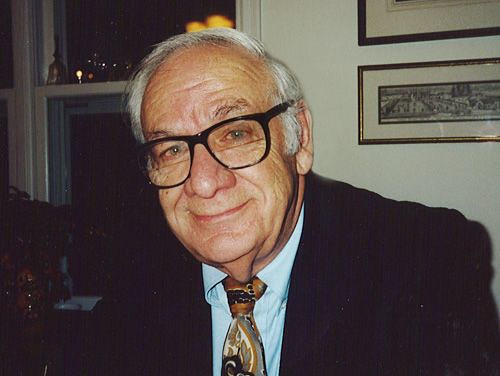

Dominick Argento, considered to be America's preeminent composer of lyric opera, was born in York, Pennsylvania in 1927. At the Peabody Conservatory, where he earned his Bachelor's and Master's degrees, his teachers included Nicholas Nabokov, Henry Cowell, and Hugo Weisgall. Argento received his Ph.D. from the Eastman School of Music, where he studied with Alan Hovhaness and Howard Hanson. Fulbright and Guggenheim Fellowships allowed him to study in Italy with Luigi Dallapiccola and to complete his first opera, Colonel Jonathan the Saint. Following his Fulbright, Argento became music director of Hilltop Opera in Baltimore, and taught theory and composition at the Eastman School. In 1958, he joined the faculty of the Department of Music at the University of Minnesota, where he taught until 1997. He now holds the rank of Professor Emeritus. Although Argento's instrumental works have received consistent praise, the great majority of his music is vocal, whether in operatic, choral, or solo context. This emphasis on the human voice is a facet of the powerful dramatic impulse that drives nearly all of his music, both instrumental and vocal. Music critic Heidi Waleson has described Argento's work as "richly melodic... [his] pieces are built with wit and passion, and always with the dramatic shape and color that make them theater. They speak to the heart." During his years at Eastman, Argento composed his opera, The Boor (1957), which has remained in the repertoire; John Rockwell of The New York Times, writing of a 1985 production, stated that “[it] taps deep currents of sentiment and passion.” Following his arrival in Minnesota, the composer accepted a number of commissions from significant organizations in his adopted state. Among these were the Saint Paul Chamber Orchestra, who commissioned his suite Royal Invitation (1964); and the Civic Orchestra of Minneapolis, who commissioned Variations for Orchestra [The Mask of Night] (1965). Argento's close association with Sir Tyrone Guthrie and Douglas Campbell, directors of the Minnesota Theatre Company, led to his composing incidental music for several Guthrie productions, as well as a ballad opera, The Shoemaker's Holiday (1967). The 1970's and 1980's saw the composer working increasingly in the song cycle form, while still writing operas and orchestral music. Among his major song cycles are: Letters from Composers (1968); To Be Sung Upon the Water (1973); From the Diary of Virginia Woolf (1975); the chorale I Hate and I Love (1982); The Andree Expedition (1983); and Casa Guidi (1983). His most recent song cycles, both premiered in 1996, are A Few Words About Chekhov (mezzo-soprano, baritone, and piano), given its premiere by Frederica von Stade, Håkan Hagegård, and accompanist Martin Katz at the Ordway Theater in St. Paul; Walden Pond (mixed chorus, harp, and three cellos), commissioned and premiered by the Dale Warland Singers; and Miss Manners on Music, to texts by the noted advice columnist. Since the early 1970's the composer's operas, which have always found success in the U.S., have been heard with increasing frequency abroad. Nearly all of them, beginning with Postcard from Morocco (1971), have had at least one European production. Among these are The Voyage of Edgar Allan Poe (1976), Miss Havisham's Wedding Night (1981), and Casanova's Homecoming (1984); Robert Jacobson of Opera News described the latter work as "a masterpiece." The Aspern Papers was given its premiere by Dallas Opera in November 1988 to great acclaim, was telecast on the PBS series Great Performances, and was again presented, to critical praise, by the Washington Opera in 1990. It since has been heard in Germany and in Sweden; June 1998 brought a performance at the Barbican Centre in London. Dominick Argento has examined fame and the immigrant experience in his newest opera, The Dream of Valentino, set in the early days of Hollywood. Washington Opera gave the work its premiere under the baton of Christopher Keene in January 1994, followed by its co-commissioning company, Dallas Opera, in 1995. The production featured special multi-media sets by John Conklin and costumes by the couturier Valentino. Writing of the premiere, Peter G. Davis of New York magazine stated, "What a pleasure to encounter a real opera composer, one who has studied and learned from his predecessors, loves the form, understands its conventions, has mastered them, and then lets his imagination take wing." The Dream of Valentino received its European premiere in February 1999 in Kassel, Germany. Among other honors and awards, Dominick Argento received the Pulitzer Prize for Music in 1975 for his song cycle From the Diary of Virginia Woolf. He was elected to the American Academy of Arts and Letters in 1979, and in 1997 was honored with the title of Composer Laureate to the Minnesota Orchestra, a lifetime appointment. In honor of his 85th birthday, the University of Maryland presented a special career retrospective that included Miss Havisham’s Fire, Postcard from Morocco, and Miss Manners on Music, as well as other recitals and lectures. — August 2012
[Reprinted by kind permission of Boosey & Hawkes.]
[Links in this box and below refer to my Interviews elsewhere on my website. BD] |
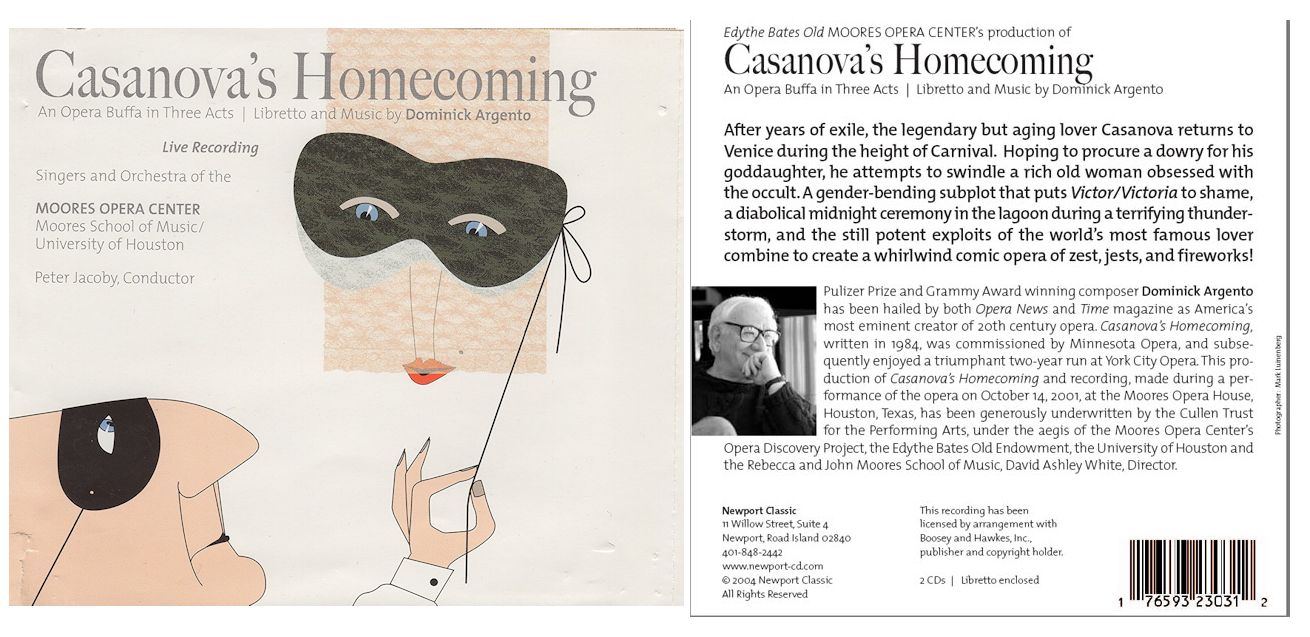
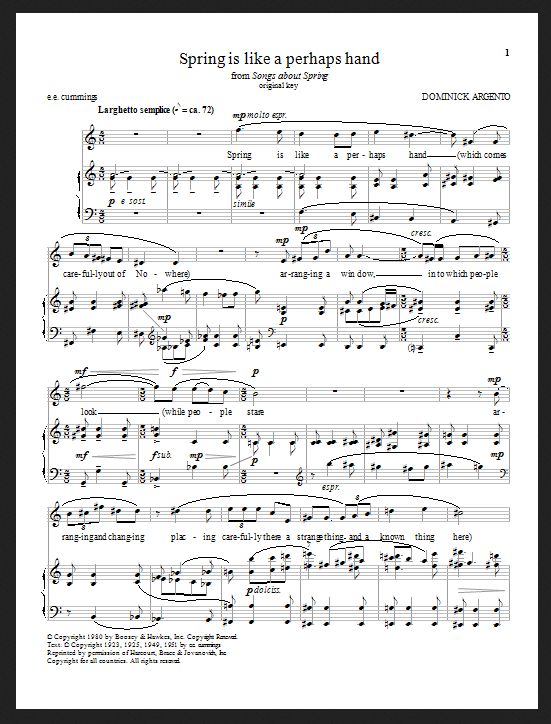 DA: The teaching hasn’t changed
as far as I’m concerned. The students have changed. I don’t
even know that I teach composition. That sort of glamorizes what
I do.
DA: The teaching hasn’t changed
as far as I’m concerned. The students have changed. I don’t
even know that I teach composition. That sort of glamorizes what
I do. 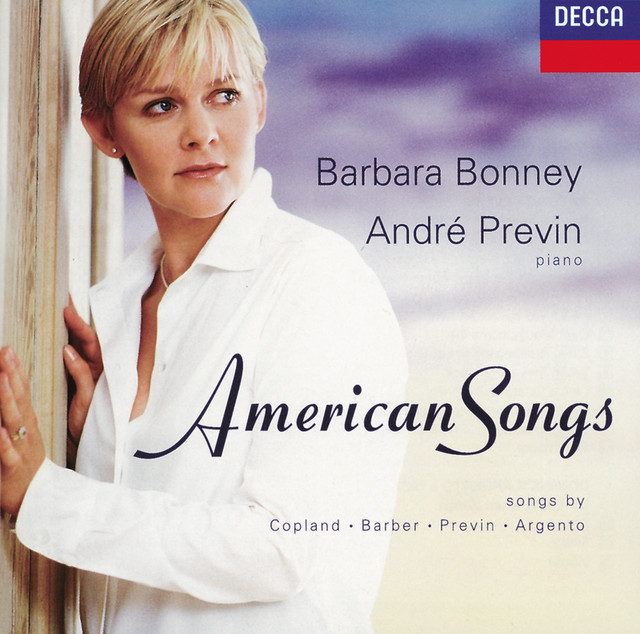 DA: I think we rationalize it. It obviously
was the way I wanted to write. I had an opera done just last month
at the university which I wrote thirty-three or thirty-four years ago.
It was never performed, and it was a student work I wrote for my master’s
degree. It sat around, and the older I got the more embarrassed I
was by the piece. It was amateurish, clearly school work, juvenilia,
but we needed something for the opera workshop. It was performed,
and I was surprised when listening to it how I would have known immediately
that was my music. It doesn’t sound exactly like a piece of mine
today, but it has lot of the earmarks. My fingerprints that I’ve
come to recognize are all over my music, and oddly enough the reviews in
the local papers, the Minneapolis and St. Paul papers both picked up on the
fact that they would have known that this was a piece by me because they’ve
known my music for the last twenty years so well. But there’s no
conscious effort to do that. My music is lyrical because it’s sung.
I like dealing with words, so it’s almost given that I turned out
to be lyrical. I was that way from the very start. I never saw
any reason to not do it because that’s the kind of music I wanted to do.
There was a long period where it was not really very fashionable to do it.
I simply went ahead because I didn’t like writing other kinds of music,
and it wasn’t natural for me to do otherwise. I could do it... I could
have written other ways. As a matter of fact, I even did for a couple
of pieces where I deliberately thought I would like to be a little more part
of the avant-garde scene. But then I found out that I was really starting
to sound like a bunch of other things, and that it was far better to be hung
for a sheep than a goat, or whatever the expression is. [Vis-à-vis
the recording shown at left, see my Interviews with Barbara Bonney, and André Previn.]
DA: I think we rationalize it. It obviously
was the way I wanted to write. I had an opera done just last month
at the university which I wrote thirty-three or thirty-four years ago.
It was never performed, and it was a student work I wrote for my master’s
degree. It sat around, and the older I got the more embarrassed I
was by the piece. It was amateurish, clearly school work, juvenilia,
but we needed something for the opera workshop. It was performed,
and I was surprised when listening to it how I would have known immediately
that was my music. It doesn’t sound exactly like a piece of mine
today, but it has lot of the earmarks. My fingerprints that I’ve
come to recognize are all over my music, and oddly enough the reviews in
the local papers, the Minneapolis and St. Paul papers both picked up on the
fact that they would have known that this was a piece by me because they’ve
known my music for the last twenty years so well. But there’s no
conscious effort to do that. My music is lyrical because it’s sung.
I like dealing with words, so it’s almost given that I turned out
to be lyrical. I was that way from the very start. I never saw
any reason to not do it because that’s the kind of music I wanted to do.
There was a long period where it was not really very fashionable to do it.
I simply went ahead because I didn’t like writing other kinds of music,
and it wasn’t natural for me to do otherwise. I could do it... I could
have written other ways. As a matter of fact, I even did for a couple
of pieces where I deliberately thought I would like to be a little more part
of the avant-garde scene. But then I found out that I was really starting
to sound like a bunch of other things, and that it was far better to be hung
for a sheep than a goat, or whatever the expression is. [Vis-à-vis
the recording shown at left, see my Interviews with Barbara Bonney, and André Previn.]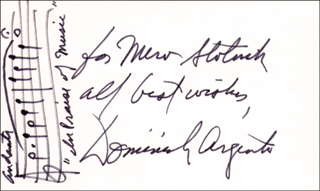 BD: It takes on a different aura?
BD: It takes on a different aura? 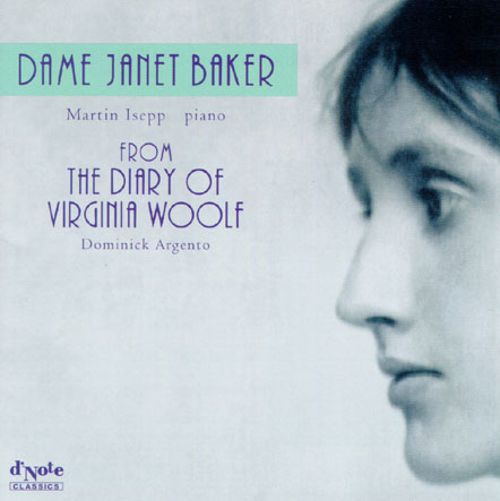 DA: Britten was probably the
last, and yet occasionally you’ll have a wonderful review of an opera
by Glass
— though it’s too early to judge that — or
even by Henze.
In the case of Henze, his works get repeated a fair amount in Germany
and other countries. Here we get things just once. In any
year we’ll do the Consul, or whatever, but it’s too early to say
that these are repertoire pieces yet. When you look back for thirty
or forty years, the last orchestral work would be the Bartók Concerto
for Orchestra [1945], which is firmly lodged in the repertoire. Somebody’s
going to be playing every year somewhere.
DA: Britten was probably the
last, and yet occasionally you’ll have a wonderful review of an opera
by Glass
— though it’s too early to judge that — or
even by Henze.
In the case of Henze, his works get repeated a fair amount in Germany
and other countries. Here we get things just once. In any
year we’ll do the Consul, or whatever, but it’s too early to say
that these are repertoire pieces yet. When you look back for thirty
or forty years, the last orchestral work would be the Bartók Concerto
for Orchestra [1945], which is firmly lodged in the repertoire. Somebody’s
going to be playing every year somewhere.|
Vern Sutton (born April 8, 1938) is an American operatic tenor, opera director, and academic. A founding member of the Minnesota Opera, he has created roles in the world premieres of several contemporary operas with that company, including works composed for his voice by Dominick Argento, Libby Larsen, Eric Stokes, Conrad Susa, and Robert Ward. He was also a regularly featured singer on Garrison Keillor's A Prairie Home Companion for three decades, beginning with its first broadcast in 1974. From 2002 to 2005 he was director of Opera in the Ozarks at Inspiration Point. For 36 years he taught on the voice faculty and for 30 years he directed the opera program of the music school at the University of Minnesota. During this time he also served as the director of the music school from 1991 to 1998. |
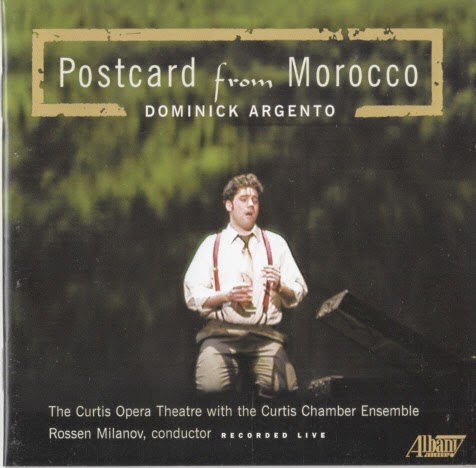 BD: So for your pieces, you want them left exactly
where they are?
BD: So for your pieces, you want them left exactly
where they are? 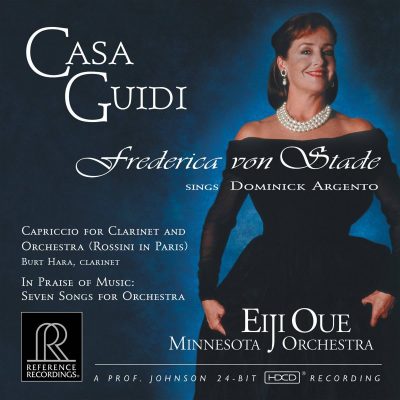 BD: Do you ever find that performers
or conductors discover things in your pieces which even you did not
know were there?
BD: Do you ever find that performers
or conductors discover things in your pieces which even you did not
know were there? 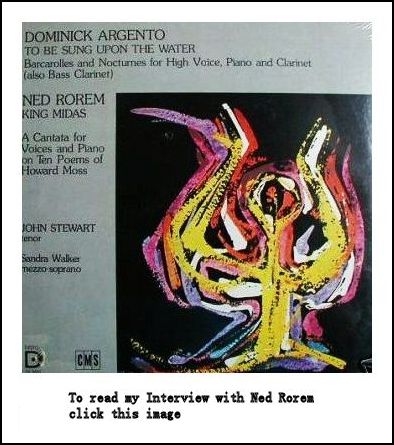 BD: You don’t have post-partum distress?
BD: You don’t have post-partum distress?
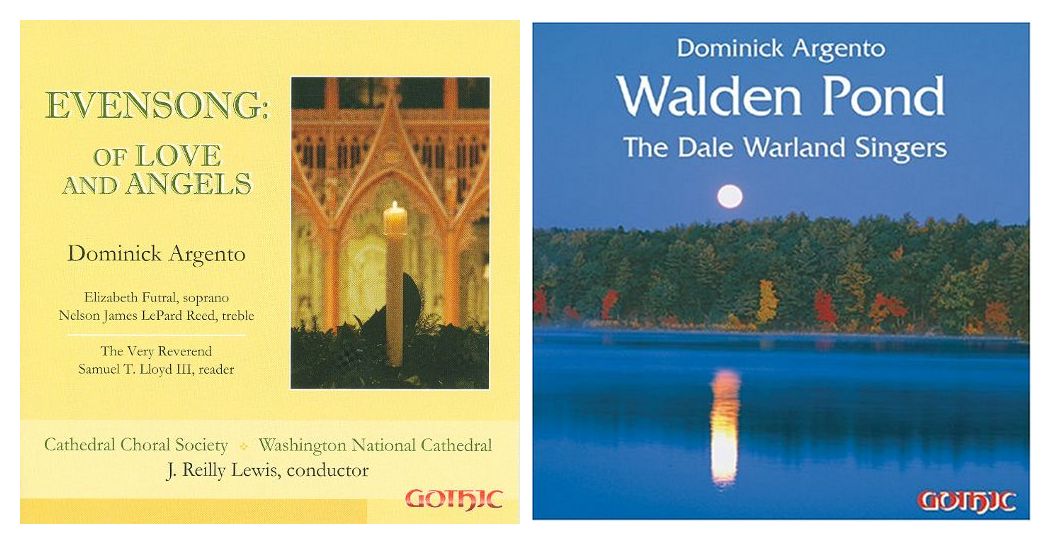
© 1986 Bruce Duffie
This conversation was recorded in Chicago on June 6, 1986. Portions were broadcast on WNIB the following year, and again in 1992 and 1997. A copy of the unedited audio was placed in the Archive of Contemporary Music at Northwestern University, and in the Oral History of American Music archive at Yale University. This transcription was made in 2017, and posted on this website at that time. My thanks to British soprano Una Barry for her help in preparing this website presentation.
To see a full list (with links) of interviews which have been transcribed and posted on this website, click here.
Award - winning broadcaster Bruce Duffie was with WNIB, Classical 97 in Chicago from 1975 until its final moment as a classical station in February of 2001. His interviews have also appeared in various magazines and journals since 1980, and he now continues his broadcast series on WNUR-FM, as well as on Contemporary Classical Internet Radio.
You are invited to visit his website for more information about his work, including selected transcripts of other interviews, plus a full list of his guests. He would also like to call your attention to the photos and information about his grandfather, who was a pioneer in the automotive field more than a century ago. You may also send him E-Mail with comments, questions and suggestions.